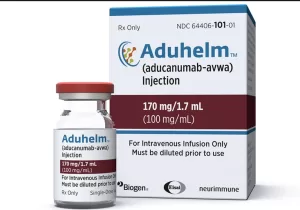Alzheimer’s is the main cause of dementia in the world. Over 30 million people are affected worldwide. That’s why scientists everywhere are trying to find a cure– not an easy task. So, are there any advantages yet?
2021: the first drug against amyloid
In 2021 a new drug started to get some recognition: the name was Aducanumab. It reduced the amount of amyloid in your brain.
And what is amyloid? It’s a substance that deposits in patients with Alzheimer’s.
When scientists looked at the brains of patients with Alzheimer’s, they saw tiny plaques under the microscope. However, when they looked at a healthy individual’s brain, there were no plaques.
Those plaques were made of a substance called amyloid and everybody agreed they were responsible for the disease.
· June 2021: FDA approves Aducanumab
And it was a controversial decision. Usually, you have to run several trials before FDA approves your drug. In this case, they approved it after an unusually low number of trials.

They proved it was safe, but they didn’t prove it was effective.
So why did they “rush”? Because there had been cero advances against Alzheimer’s in the last decades, and everybody was anxious for a break-through– doctors, the FDA, patients…
The decision was so controversial that, in fact, 3 experts on panel resigned in protest. They believed they should not approve it with such small evidence.
· January 2023: FDA approves Lecanemab
The same story kind of repeated itself. The FDA approved a second drug against Alzheimer’s, Lecanemab.
It had the same effect: it would reduce amyloid content in the patients brain.
So, how are they doing so far?
Not so good, to be honest.
In my opinion, both drugs have only proven to be good at reducing amyloid plaques. But, they are not improving the patients’ memory or their quality of life.
Getting rid of those amyloid plaques is not effective because patients don’t get better. Maybe those plaques have already damaged the brain, and it can’t heal back after removing them.
But patients don’t care about amyloid plaques, they just want to get better. They want to not lose their memory so fast and to enjoy more time with their loved ones, before the disease makes them unrecognizable.
Doctors thought reducing amyloid plaques patients would improve them but, unfortunately, that’s not the case.
Some studies showed a mild improvement in memory but it was too small so neither patients nor family could tell the difference.
I sincerely doubt there is a meaningful difference.
One last plot twist: shrinking brains?
When people get Alzheimer’s their brains gradually shrink. So, what would you expect to happen after using one of these drugs? They should slow down the shrinking, right?
Well, some of these drugs actually make brains smaller. We don’t know why and we don’t really know what that means.
It doesn’t necessarily mean it is bad for the patient. However, it does seem striking that they have, of all, that precise side effect.
All in all, I don’t think today’s drugs against Alzheimer’s are in a very good place right now.
Would you risk having some side effects in exchange for a tiny, imperceptible improvement?
Leave a Reply